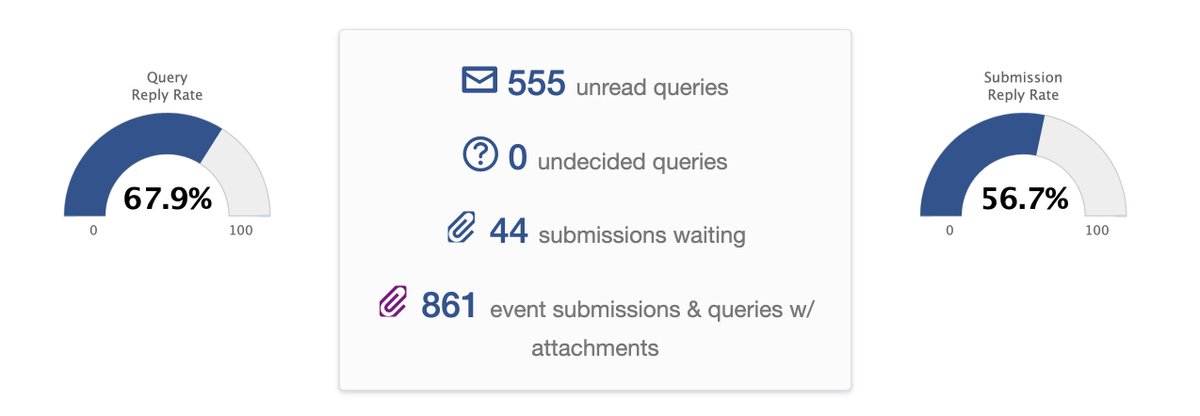As an agent who is closed to queries and desperately trying to get through her slush pile (s/o to QueryManager for the incredible self-own that is the stats homepage) I've been thinking about how tech like this is influencing querying, for better and worse. (thread)
First, an explanation for those not in the know: QueryManager is a free (!) online service that allows agents to manage all their queries outside of their inbox. It has flags and letter grades and tags, etc. When I'm in the mood to read romance I can filter my subs! How neat!
Writers submit by filling out a form (versus emailing an agent directly), and agents can customize the form to fit their needs. I hate reading synopses, so I don't ask for them, but I def want the first three chapters uploaded, and my form requires this.
What this form means is that the opportunities for an author to "mess up" by not including the Exact Right Thing Required by a Specific Agent is lessened. I put "mess up" in quotes here because, well, we'll get to that.
There's an inherent flaw in querying as a process, and it's both a feature and a bug. The feature is that this is simply a process designed to connect individual agents with projects they can sell; it's the stage that first begins to turn your art into a product for consumption.
But the process isn't a meritocracy, and since agents read queries outside of work hours, quickly and decisively, a book might be turned down for dozens of factors beyond a simple "this agent doesn't think this book is good enough/a fit for them."
Services like QM allow agents to do things like sort queries by wordlength, which can be flagged and rejected without reading. On the surface, that seems nice and organized, but when you dig into the underlying structures of publishing, it becomes quite problematic
Now, things like word count rules have actual, production-based (read: financial) origins, but putting hard-and-fast rules around artistic products makes it really, really easy to never take a chance, and that keeps publishing incredibly homogenous.
I'm thinking about the authors that sit outside access to day-long query workshops. The authors that are underrepresented in publishing, playing with form, genre, and story in ways tradpub hasn't seen, as a result, come up with something incredible but outside typical "rules"
Then I think about the agents who desperately want to champion these authors, but who perhaps aren't getting these books because of the way in which they read and organize their submissions.
BUT! All is not lost! One thing I love about QM is that it allows space for authors to check in with agents about their subs, which is an incredible thing to encourage. When I was doing queries via email, I didn't want check-ins because it messed up the order in which I read subs
But now? Nothing gets bumped out of the queue, and checking-in helps equalize the power dynamics right off the bat between agent and writer (related: I'm still reading subs from last December, and I'm very much trying hard to get through them! Thanks for checking in!)
QM also allows an agent to create a special submission form for events with different requirements from your normal query form. For events like #DVpit, which is an accessible, alternate way to get underrepresented authors matched with agents, and reduces the focus on the query
As an agent, I know that a query is a *difficult* document to write. It's also a skill that will have very little impact on the rest of your career, so I like that QM is making room for alternatives.
Querying, as a process, is very easily treated as or manipulated into a prejudicial process, one rife with unspoken rules and authors terrified of making what they're told are career-stopping missteps that, frankly, do not matter. This is why I put "mess up" in quotations.
I have grown increasingly skeptical of agents who have Hard and Fast Rules about querying--listen, I honestly don't care of you accidentally send me a query with another name in it--I know this is a form letter. Shit happens. I'm just glad you're subbing widely.
I also *could not care less* if you have your metadata in the front of your query or after the plot paragraphs. I only care about the document's length insofar as I get all the information I need in a skimmable document.
While we have the technological tools to filter and sort out slush pile into oblivion, I truly believe that doing so is bad for the writer and for the agent. IMO, the best way to get through queries is simply to close to them for a while, not to shrink your wishlist to a pinprick
I am thrilled that QM exists, but I hope my fellow agents think critically about how their use of the program, even down to laying out their submission forms, will affect their list and the writers who want to work with you.

 Read on Twitter
Read on Twitter


